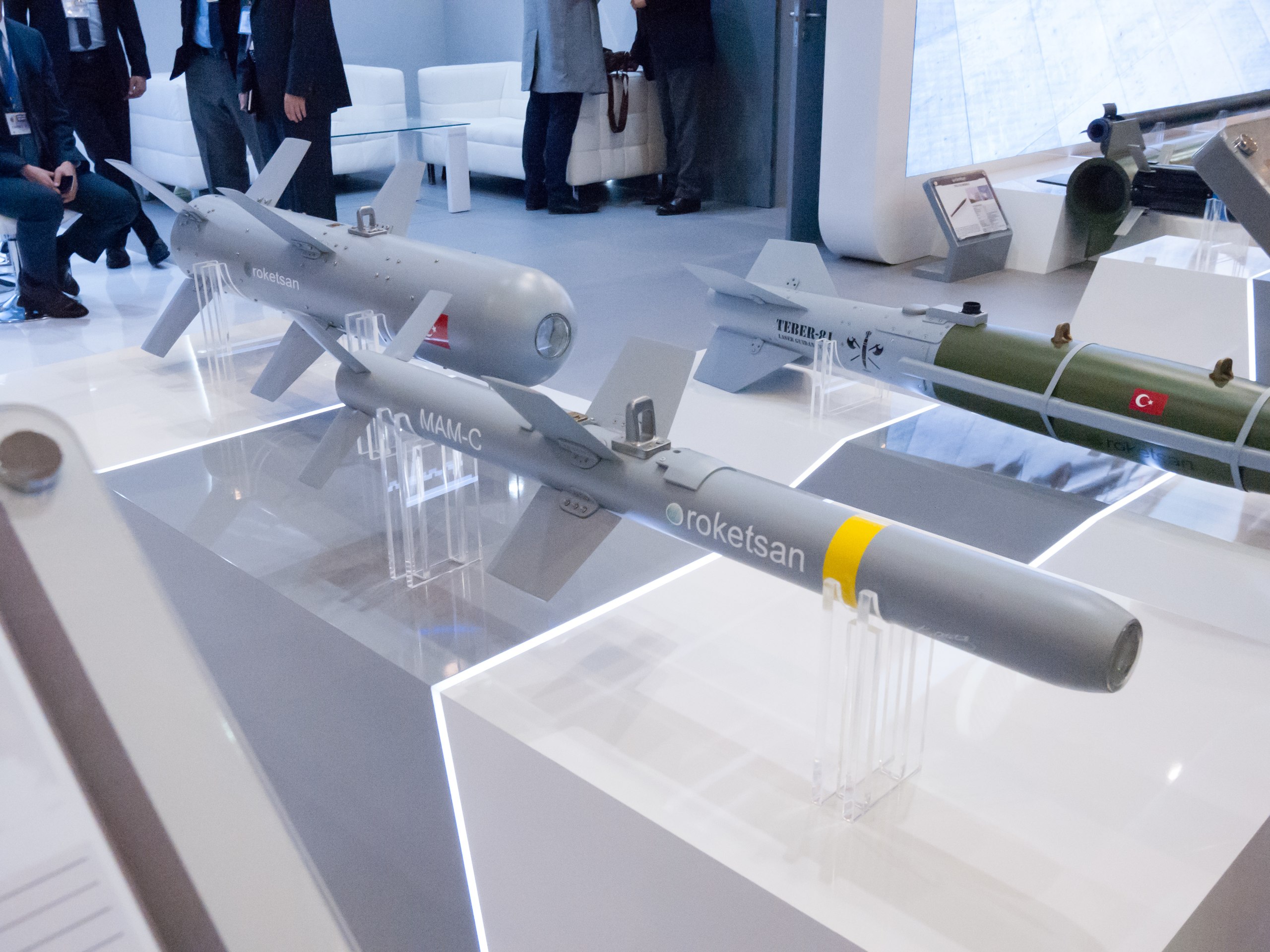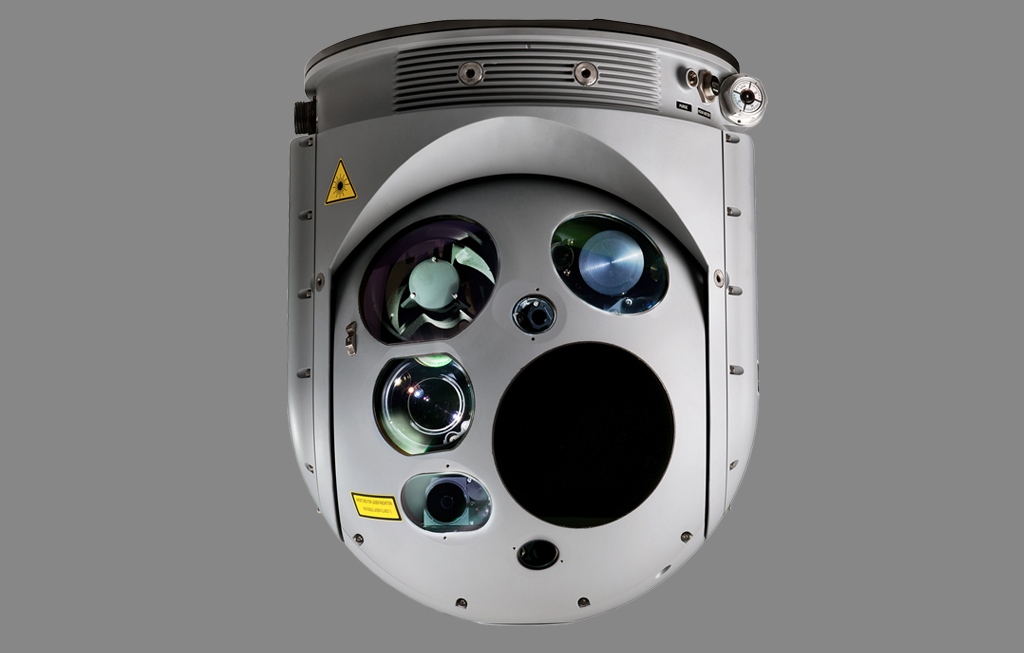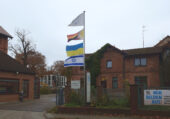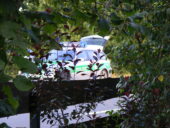Turkey’s best-selling armed drone is equipped with cameras from German company Hensoldt, a spokesperson confirms. The device could guide missiles developed with German help to a target. The government in Berlin also has a stake in the defence company. Turkey uses the drones for attacks that violate international law.
For almost two decades, companies from the USA and Israel were the undisputed market leaders for armed drones, but now China and Turkey can count more and more exports in their favour. The Turkish “Bayraktar TB2”, which has been used by the government in Ankara since 2016 in the Turkish, Syrian and Iraqi parts of Kurdistan in violation of international law, is particularly attracting attention. In the four-month Operation Olive Branch in Kurdish Rojava alone, the “TB2” is said to have scored 449 direct hits and enabled fighter planes or helicopters in 680 occasions to do so.
The drone with a payload of 65 kilograms is manufactured by Baykar; its namesake and founder is Selçuk Bayraktar, who is now also the son-in-law of the Turkish president. The “TB2” has also flown attacks on enemy troops for the Tripoli government in Libya and on behalf of Azerbaijan; it may even have been decisive in the war in Nagorno-Karabakh. After Qatar, Ukraine, Morocco, Tunisia and Turkmenistan, Baykar is to sell the drone as the first NATO country to Poland, interest is also reportedly coming from Lithuania.
Key components have to be imported
The comparatively young Turkish drone industry can produce many components for its unmanned aerial vehicles itself or buy them from domestic suppliers, but the manufacturers are still dependent on imports for key components. This applies to engines, for example, which are also produced in Turkey but are heavier than competing products. That is why the “TB2” flew with Rotax engines from Austria, among others. After the Turkish support of the Azerbaijani aggressive war, Rotax stopped the delivery of their engines to Baykar.
As reported by the Kurdish news agency ANF, Baykar also bought from Continental Motors, a US corporation partly based in Germany that took over Thielert Aircraft Engines GmbH eight years ago.
A cruise control system from the Bavarian company MT-Propeller was also found in a crashed “TB2“, writes the magazine Zenith after researching in Armenia. According to the Armenian National Committee of America, a radar altimeter made by the German SMS Smart Microwave Sensors GmbH and a fuel filter made by the also German company Hengst were also installed in the drone.
However, exports of these products are not subject to governmental authorisation, and sales may also have been made through intermediaries. Hengst, for example, also sells its products in the automotive wholesale trade; the company says it does not know how the filter came into Baykar’s possession. All other companies did not respond to a request for comment.
Gimbal with laser designator
In the beginning, the “TB2” was equipped with a sensor module from the Canadian manufacturer Wescam. It is the eye of the drone, which is placed in a hemispherical container on the fuselage. This so-called gimbal can be swivelled through 360° and contains optical and infrared-based cameras.
Wescam has finally stopped its cooperation with Baykar after the Ottawa government issued an export ban in connection with the war over Nagorno-Karabakh. The country had already imposed a temporary halt to deliveries after Turkish operations in the Kurdish region Rojava in Northern Syria.
Selçuk Bayraktar commented on the decision taken by the Canadian Foreign Minister by saying that the required sensor technology could now also be produced in Turkey. According to experts, however, the cameras produced by Aselsan, for example, are heavier than the imported devices, so that the payload of small armed drones would be drastically reduced.
German government holds shares in Hensoldt

The Hensoldt Group from Germany, which specialises in sensor technology, could now benefit from the continuing need for imports. This is indicated by footage of a parade in the capital of Turkmenistan, where a freshly purchased “TB2” was shown in a huge parade in Aşgabat a fortnight ago on the occasion of the 30th anniversary of the attainment of independence, the blog “Oryx”, which specialises in military technology, wrote last week.
The drone was equipped with a gimbal from Hensoldt, which contains, among other electro-optical sensors, the ARGOS-II module. In military operations it can illuminate enemy units by laser and guide a missile into the target.
Hensoldt was created after a spin-off of various divisions of the armaments company Airbus, including the radar, optronics, avionics and electronic equipment jamming business. As a company of outstanding security policy importance, the German Ministry of Defence had secured a blocking minority. The Italian defence group Leonardo is also a shareholder.
The ARGOS module is manufactured by Hensoldt subsidiary Optronics Pty in Pretoria, South Africa. When asked, a company spokesperson confirmed the cooperation with Baykar. According to this, the devices from South Africa were delivered to Baykar in an undisclosed quantity “as part of an order”. In the process, “all applicable national and international laws and export control regulations” were complied with.
Approvals for missile technology
The armament of the “TB2” with laser-guided missiles was also carried out with German help. This is indicated by answers to parliamentary questions in the German Bundestag which were first reported by the TV magazine “Monitor”. According to these, the German Foreign Ministry has issued several export licences for warheads of an anti-tank missile since 2010. They originate from the company TDW Wirksysteme GmbH from the Bavarian town of Schrobenhausen, an offshoot of the European missile manufacturer MBDA.
The sales were presumably made to the state-owned Turkish company Roketsan. Equipment or parts for the production of missiles are also said to have been exported.
The guided missiles from TDW were the types “LRAT” and “MRAT”, which are produced in Turkey under different names. Based on them, Roketsan is said to have developed the “MAM” missiles for drones. These so-called micro-precision munitions are light warheads that can be used to destroy armoured targets; now they are part of the standard equipment of the “TB2”.
No information on sales to third countries

Roketsan sells the MAM guided missiles in three different versions, including a so-called vacuum bomb. They may have been developed with the cooperation of the Bavarian company Numerics Software GmbH, at least that is what ANF writes. Numerics specialises in calculating the optimal explosive effect of armour-piercing weapons. According to the German Foreign Ministry, however, the company’s products, for which licences were granted for export to Turkey, are not suitable for the warheads in question.
When the government issues export licences for military equipment, it can insist on a so-called end-use declaration. Turkey would then be obliged to obtain German permission before any resale to a third country.
Germany’s Foreign Ministry does not want to say whether such an exchanges about missiles, sensors or other German technology have taken place. According to an answer from last year, export licences for goods “for use or installation in military drones” with a total value of almost 13 million Euros were issued to Turkey.
Note: After a statement from Hensoldt and Hengst, the article and its lead were updated and illustrated on 12th October.
Image: The hemispherical gimbal contains electro-optical sensor technology, the technology is also used on aircraft of the German Federal Police and Frontex (Hensoldt, press release)





Leave a Reply